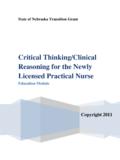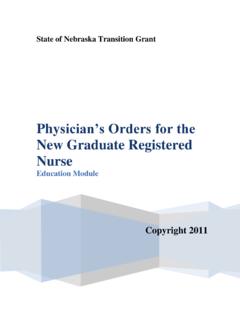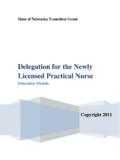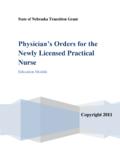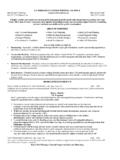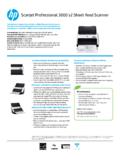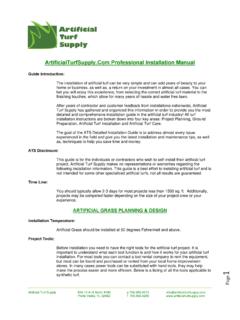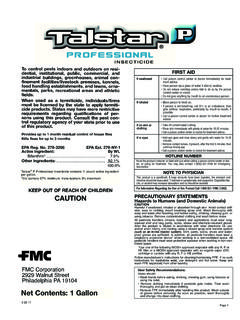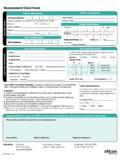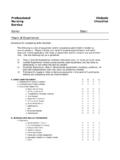Transcription of Professional Collaboration for the New Graduate …
1 State of Nebraska Transition Grant Professional Collaboration for the New Graduate Registered Nurse Education Module Copyright 2011. Title: Professional Collaboration Collaboration generally means to work together. Each Professional in a collaborative relationship shares information and resources and is accountable for the process and outcomes specific to their specialty. Collaboration implies a process called team work in which all healthcare team members work together and consult with each other depending on the patient's needs or health status. When individuals and groups collaborate or work together successfully, the whole is greater than the sum of the parts.
2 The richness of the contribution of each member is reflected in services and outcomes that would not be achieved by individual members in isolation. With the complexity of health care increasing, quality care often requires care from many types of professionals. Nurses bring a nursing perspective and nursing skills to patient encounters. Some of the unique skills specific to nursing include knowledge of family and community resources, clinical experience in home care and public health, health promotion, health education and counseling, patient empowerment to follow medical regimen and prevention strategies and a holistic care approach.
3 All nurses share a commitment to quality care that is patient-centered. Effective Collaboration among nurses and within organizations is essential in order to achieve quality patient outcomes. Collaboration in the practice setting is evident when nurses: talk with one another, share perspectives, plan together and provide care, are clear about their roles and the roles of others, and support and assist each other in the interest of client care. Collaborative nursing practice faces many barriers. A lack of understanding of the roles of other nursing groups and inconsistencies prevent nurses from working together effectively.
4 A lack of clarity of roles is further eroded by archival perspectives that do not reflect current realities. When understanding of roles is enhanced, respect for each nurse's contribution is also increased. Your attitude as a nurse with fellow healthcare members can make or break how you are accepted into the organization. Nurses requires access to supports and resources in order to provide safe and appropriate care. These include effective nursing leadership, appropriate and sufficient staff, adequate nurse-patient ratios, organizational support for collaborative practice and sufficient time to discuss patient care needs with colleagues.
5 Collaboration and consultation are essential elements of safe, competent, ethical nursing practice. Nurses are expected to collaborate with patients, with each other and with members of the health care team for the benefit of the patient. Nurses are also expected to consult with others when any situation is beyond their competence. Collaboration is ongoing communication and decision-making with the goal of working toward identified patient care outcomes. Effective communication skills are critical to successful consultation and Collaboration As a nurse think about what are you doing as a nurse and consumer of healthcare to promote collaborative relationships among nurses and other healthcare team members.
6 Learning Objectives: Upon completion of this education module, the newly licensed Registered Nurse will: 1. Describe own strengths, limitations and values in functioning as a member of a team. 2. Respect unique attributes that other intergenerational health care members bring to the workplace. 3. Describe sources of conflict in the healthcare environment. 4. Discuss strategies for communicating and resolving conflict among healthcare team members in the work place. 5. Evaluate how you feel about being a newly licensed Registered Nurse and how you are treated by others in the healthcare arena.
7 6. Analyze differences in communication style preferences among patients and families, nurses and other members of the healthcare team. Interactive Exercises: 1. Ask yourself the following questions. Do your answers reflect a positive or negative attitude? Do you find that no one wants to work with you? Are you constantly preoccupied with how everyone else does their job? Is it your way or no way? Do you worry about how will be perceived by others? When working with a new nurse do you feel a loss of control over your job assignment? Are you a moaner and groaner?
8 Do you think that no one else does anything right? Do you always have to make yourself the hero? 2. Make a list of your opinions related to nursing as a job or nursing as a profession. Discuss these differences with your preceptor. What is nursing to you? 3. Read the paper on intergenerational nurses and discuss it with fellow nurses at your facility. 4. Observe your workplace environment for examples of conflict that occur. How can the conflict be resolved? 5. Read the by Judith Meissner, "Nurses: Are we still eating our young?". Discuss the major points of this article with your preceptor.
9 6. Do you avoid working with the new nurse for fear of her critiquing everything you do? Does the thought of working closely with someone and sharing your knowledge and expertise make you feel uncomfortable? Do others fail to meet your standards? Do you feel better than your peers and co-workers because you believe you hold yourself to a higher standard ? 7. Read the article on Lateral Violence by Patricia Rowell. After reading the article, answer the following questions. Are there behaviors at your workplace that are representative of lateral violence?
10 Discuss with your preceptor a definition of lateral violence, its characteristics and methods you can use as a new nurse to deal with it if it occurs. 8. Answer the following questions: How do you deal with conflict? What is your pattern of conflict management? Do you get angry when you are in conflict with others, stop talking, walk away, sulk, seek revenge? Has this been an ongoing pattern for you? How does it affect your clinical practice? How does it affect your relationship with peers? Do the effects of work conflict affect your home environment? 9.

